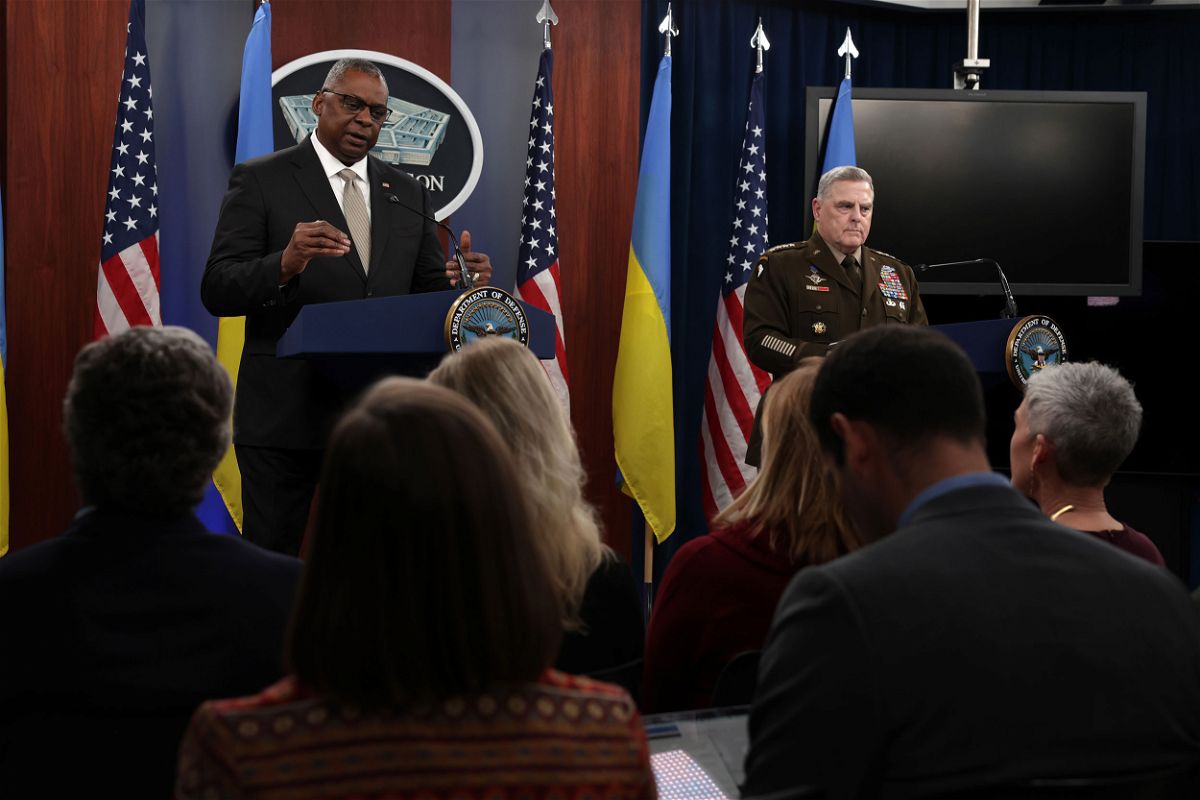Pentagon prepares for series of GOP-led investigations

Pentagon prepares for a series of GOP-led investigations. In this image
By Haley Britzky and Oren Liebermann, CNN
Pentagon officials have held multiple high-level meetings in recent months in preparation for a barrage of Republican-led House investigations into issues varying from the US withdrawal from Afghanistan to what conservative lawmakers have deemed “woke” military policies, according to a senior defense official.
House Republicans have long signaled their intent to launch a series of probes if and when they gained the majority. Some of those priorities were flagged by Republicans on the House Judiciary Committee in November last year, when they released a 1,000 page report on what they said was the politicization of the Justice Department and FBI, complete with dozens of letters sent to various government officials — current and former — detailing inquiries about various DOJ and FBI investigations.
After finally winning a protracted battle to be named House speaker in the early hours of Saturday, Rep. Kevin McCarthy suggested the Pentagon would come under scrutiny.
“We will hold the swamp accountable, from the withdrawal of Afghanistan, to the origins of covid and to the weaponization of the FBI,” McCarthy said.
Pentagon leaders are well aware that the investigations could begin soon after House members are sworn in.
Asked about the potential probes on Thursday, Pentagon spokesman Brig. Gen. Patrick Ryder said that the Defense Department “respects Congress’s important oversight role and as always will continue to work closely with Congress and respond appropriately to legitimate congressional inquiries.”
The Afghanistan withdrawal
The Biden administration’s withdrawal from Afghanistan has been a top investigative target for Republicans since its chaotic conclusion in August 2021, underscored by the killing of 13 US service members at Kabul’s international airport in the closing days of America’s longest war.
A series of key decisions including the early closure of Bagram Air Base, a perceived lack of security at Hamid Karzai International Airport, the evacuation of the US embassy in Kabul, relations with the Taliban — will likely be examined in an investigation that goes beyond the Defense Department to the State Department and the White House.
Texas Republican Rep. Michael McCaul, who is slated to take over as the House Foreign Affairs Committee chairman, told CNN on Thursday that the Republican majority will “continue to demand answers to why the withdrawal from Afghanistan was such a disaster.”
“The American people deserve transparency from this administration,” McCaul said, “especially when it comes to national security, and we will work to deliver that to them.”
Led by McCaul, Republicans on the committee prepared their own investigation into the withdrawal, released one year after the fall of Kabul. The report, which has yet to be released in its entirety, alleges a severe shortage of State Department personnel at the Kabul airport to process Afghan evacuees.
But the Defense Department has faced questions about Afghanistan already, albeit from a friendly Democratic House that faced criticism for not digging deep enough. Defense Secretary Lloyd Austin and Joint Chiefs Chairman Gen. Mark Milley have testified to Congress about the withdrawal, as has former commander of Central Command, Gen. Frank McKenzie, who openly said that he opposed a complete withdrawal.
Now it will be re-litigated by more hostile GOP-led House committees.
The White House is likely to stick to its position that the withdrawal from Afghanistan was the only feasible option after the Trump administration signed the Doha Agreement with the Taliban a year earlier. Administration members maintain that if the US had stayed longer it would have violated the agreement and would have invited attacks from a resurgent Taliban and other militant organizations.
Republicans may also investigate the effectiveness of the military’s so-called over-the-horizon options in Afghanistan, which officials promised would be a way of tracking and, if necessary, striking terrorist organizations.
FBI Director Christopher Wray said this summer that he was “worried about the potential loss of sources and collection over there.” Some intelligence officials have derided the over-the-horizon strategy as “over-the-rainbow.”
The Biden administration can point to the precision strike that killed al-Qaeda leader Ayman al-Zawahiri in downtown Kabul in August as proof of the viability of the over-the-horizon strategy. But tracking one high-value target is far different than tracking the growth of al-Qaeda throughout the country, and the Republicans may seize on that gap.
‘Woke’ military
Republicans have promised to focus on so-called “woke” initiatives and policies in the military, to include diversity and inclusion efforts and service academy literature and discussions.
The military has at times struggled to find its footing in how best to confront complaints over “wokeness”, as the institution attempts to stay out of politics. That was put on display in October when Army Secretary Christine Wormuth addressed the complaints at the annual Association of the US Army meeting in Washington, DC, saying that the Army had to stay “out of the culture wars” because “we have got to be able to have a broad appeal.”
“When only 9% of kids are interested in serving, we have got to make sure that we are careful about not alienating wide swaths of the American public to the Army,” Wormuth said.
But staying out of the conversation has become increasingly difficult as lawmakers and media pundits alike have pushed officials to respond.
Republican lawmakers have grilled defense officials including Austin and Milley on policies on diversity and inclusion, saying they are negatively impacting retention and recruitment and interfering with the military’s focus on the defense of the nation. Pentagon leaders have rejected that argument as a distraction from the military’s primary function, however, and have not cited “wokeness” as one of the main challenges to recruiting.
Wormuth and Chief of Staff Gen. James McConville, for example, said in a July memo last year that the recruiting shortage — most severe for the Army — was due to a declining number of young Americans who are qualified to serve, Covid-19-related education restraints, and a lack of trust in American institutions.
And in March 2021, Fox News’ Tucker Carlson was rebuked by military officials after mocking women in uniform during his show. Carlson complained that new uniforms meant to fit women properly and updated hair standards made “a mockery of the US military.” Service leaders and Pentagon officials alike pushed back on the rhetoric, pointing instead to honorable service of women around the military.
“They are beacons of freedom and they prove Carlson wrong through determination and dedication,” tweeted Gen. Paul Funk, head of the Army Training and Doctrine Command. “We are fortunate they serve with us.”
The tension over the topic of wokeness in the military resulted in a heated exchange between Milley and Republican lawmakers in 2021, after he was questioned about “critical race theory.” Milley said it was “offensive that we are accusing the United States military, our general officers, our non-commissioned officers of being ‘woke’ or something else because we’re studying some theories that are out there.”
Milley discussed his frustrations with lawmakers’ politicization of the military while being interviewed by the House January 6 Committee. According to the transcript of his interview, Milley acknowledged that he has “become a lightning rod for the politicization of the military,” along with several other senior military officials.
“Some of it is comments that I made in testimony about critical race theory and white rage. You know, so 90 seconds with Congressmen Gaetz and Waltz result in, you know, four, five, six months of this constant drumbeat that is very damaging, in my view, personally, to the health of the Republic, because there is a deliberate attempt, in my view, to smear the general officer corps and the leaders of the military and to politicize the military, for whatever reasons that they think that that’s valuable.”
Republican Rep. Michael Waltz, a member of the House Armed Services Committee, told Politico in November that the Biden administration is pushing a “progressive, socially-driven agenda that is being forced on the military” and that lawmakers will “provide oversight” and “legislate it.”
And just two months earlier, Rep. Mike Gallagher of Wisconsin, ranking member of the House Armed Services Subcommittee on Military Personnel, said in a statement that Republicans would “expose” diversity and inclusion ideology at the military service academies.
“I guarantee you,” Gallagher said, “when Congress is controlled by Republicans, as it will be in the new year, we’re going to push back on this and expose this ideology for the distraction from war fighting that it is.”
Oversight of Ukraine aid
Republicans have promised a harder line on US aid to Ukraine, questioning the large amount and the ability of the administration to effectively oversee the massive quantities of weapons and equipment flowing to Kyiv. Since the start of the war, the administration has given more than $24 billion in aid to Ukraine, including the largest ever package of $2.85 billion announced Friday.
In October, before it was clear Republicans had taken control of the House, Rep. Kevin McCarthy vowed there would be no “blank check” for Ukraine. Last month, McCaul, who supports ongoing weapons shipments and aid to Ukraine, said there was still a need for “oversight and accountability.”
But some House Republicans have taken a far harder line on Ukraine, vowing to oppose the high-value weapons packages the Biden administration has been sending.
The Defense Department has a small group of personnel in Kyiv under who carry out inspections of weapons and equipment provided to Ukraine. Though the team cannot visit the volatile front lines, the Pentagon says it has seen no indication that US weapons have been siphoned away from Ukrainian forces and ended up on the black market or elsewhere.
“We have no indication that there has been any type of illicit spread,” said Pentagon press secretary Brig. Gen. Pat Ryder in November.
The $40 billion Ukraine aid package passed in May also contained requirements for oversight of weapons shipments, including from the DoD Inspector General. The package also requires periodic reports from the Secretary of Defense and the Secretary of State to the oversight committees. Last month, the omnibus spending bill dedicated $6 million for oversight and inspections.
The larger and more expensive systems, such as the HIMARS rocket launchers, are easier to track on the battlefield. All of them remain in service and accounted for, according to a defense official. More difficult to track are the lower-cost, high-volume items the US has sent, such as small arms and ammunition or thousands of Javelin anti-tank missiles and Stinger shoulder-launched anti-aircraft missiles.
The Covid-19 vaccine mandate
While lawmakers at times included the military’s Covid-19 vaccine mandate in their criticisms of “woke” initiatives and policies, the fight over that particular complaint appears settled as the requirement was repealed in the new National Defense Authorization Act.
Republicans have said that the vaccine mandate had a negative impact on recruitment, which was a significant challenge for the services last year. Marine Corps Commandant Gen. David Berger also said in December that there are “still myths and misbeliefs about the backstory” of the vaccine, which was impacting recruitment in “parts of the country.”
However, a Marine Corps spokesman later clarified that Berger was not referencing specific data, and Austin said at a press conference that he has not “seen any hard data that directly links the Covid mandate to an effort on our recruiting.”
It’s unclear what lawmakers would investigate in regards to the mandate, though Indiana Republican Rep. Jim Banks, chairman of the Republican Study Committee, told Military.com last year that “[cleaning] up the mess the administration has made with the excessive and dangerous Covid mandates on our troops” would be one of Republicans’ “very top priorities.”
The-CNN-Wire
™ & © 2023 Cable News Network, Inc., a Warner Bros. Discovery Company. All rights reserved.


